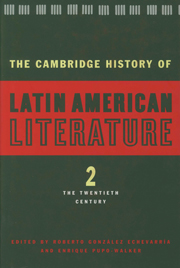Book contents
- Frontmatter
- Introduction to Volume 2
- 1 Modernist poetry
- 2 Modernist prose
- 3 The Vanguardia and its implications
- 4 The literature of Indigenismo
- 5 Afro-Hispanic American literature
- 6 The Criollista novel
- 7 The novel of the Mexican Revolution
- 8 The Spanish American novel from 1950 to 1975
- 9 The Spanish American novel: recent developments, 1975 to 1990
- 10 Spanish American poetry from 1922 to 1975
- 11 The modern essay in Spanish America
- 12 Literary criticism in Spanish America
- 13 The autobiographical narrative
- 14 The twentieth-century short story in Spanish America
- 15 Spanish American theatre in the twentieth century
- 16 Latin American (Hispanic Caribbean) literature written in the United States
- 17 Chicano literature
- Index
- Bibliographies
- References
12 - Literary criticism in Spanish America
Published online by Cambridge University Press: 28 March 2008
- Frontmatter
- Introduction to Volume 2
- 1 Modernist poetry
- 2 Modernist prose
- 3 The Vanguardia and its implications
- 4 The literature of Indigenismo
- 5 Afro-Hispanic American literature
- 6 The Criollista novel
- 7 The novel of the Mexican Revolution
- 8 The Spanish American novel from 1950 to 1975
- 9 The Spanish American novel: recent developments, 1975 to 1990
- 10 Spanish American poetry from 1922 to 1975
- 11 The modern essay in Spanish America
- 12 Literary criticism in Spanish America
- 13 The autobiographical narrative
- 14 The twentieth-century short story in Spanish America
- 15 Spanish American theatre in the twentieth century
- 16 Latin American (Hispanic Caribbean) literature written in the United States
- 17 Chicano literature
- Index
- Bibliographies
- References
Summary
Literary criticism already has a long and distinguished history in Spanish America, one that encompasses such diverse figures as Andrés Bello (1781–1865), Jose Enrique Rodó (1871–1917), Pedro Henriquez Urena (1884–1946), Alfonso Reyes (1889–1959), Emir Rodríguez Monegal (1921–1985), and Angel Rama (1926–1983). Nevertheless, Spanish American literary criticism has sometimes had to contend with feelings of inadequacy, not only in comparison to its subject but also to the literary criticism of Europe and the United States.
The inadequacy has often been real, of course, and Spanish American critics have been the first to point out the deficiencies and vices of criticism in Spanish America, as well as the obstacles it has had to face. Among the former, critics note its mimetic character, journalistic superficiality, lack of patience with serious scholarship, and ideological tendentiousness; among the latter are censorship, exile, and sheer lack of financial and institutional support. The absence of any book-length history of Spanish American criticism is probably symptomatic of the unease Spanish American critics and literary historians share with regard to this subject.
Feelings of inadequacy and belatedness are nevertheless endemic to literary criticism wherever it occurs, however much critics may try to hide them beneath an authoritarian rhetoric. In modern literature, which has absorbed criticism into its make-up to a very high degree but without its institutional or ideological constraints, there is always a propensity to surpass the exegetes. This in turn has forced critics to compete with creative writers in the elaboration of ever more probing theories of what literature is and how it achieves its effects.
- Type
- Chapter
- Information
- The Cambridge History of Latin American Literature , pp. 425 - 457Publisher: Cambridge University PressPrint publication year: 1996
References
- 1
- Cited by

